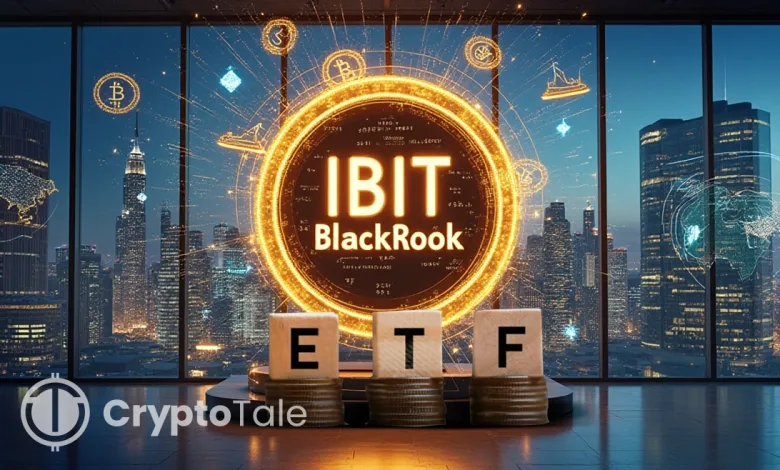BlackRock’s Bitcoin ETF IBIT Grows Fast to Rank Top 3 in ETF Rankings

- IBIT becomes BlackRock’s 3rd top-earning ETF just 18 months after its launch.
- The ETF now earns more revenue than IVV despite having smaller assets and fewer years.
- IBIT is just $9 billion in assets behind IWF and may soon become BlackRock’s top ETF.
BlackRock’s iShares Bitcoin Trust ETF (IBIT), launched only 18 months ago, has swiftly risen to become the third-highest revenue-generating fund in the firm’s vast portfolio of 1,197 ETFs. Bloomberg Senior ETF Analyst Eric Balchunas confirmed IBIT’s estimated $191 million in annual revenue, placing it behind only two older funds: the iShares Russell 1000 Growth ETF (IWF) at $211 million and the iShares MSCI EAFE ETF (EFA) at $207 million. IBIT is just $9 billion behind IWF in assets under management, signaling a potential shift in the top ETF rankings.
IBIT currently manages approximately $76 billion in assets. It charges a 0.25% expense ratio, which contributes significantly to its annual revenue. This figure surpasses that of the iShares Core S&P 500 ETF (IVV), which, despite holding over $627 billion in assets, brings in only around $188 million due to its ultra-low 0.03% fee. Eric Balchunas described IBIT as “literally an infant” and noted the fund’s extraordinary growth and early success in surpassing many well-established ETFs.
The ETF closed at $62.19 on July 3, 2025, up 4.28% for the month, marking a $2.55 increase. In after-hours trading, it gained another 0.53% to reach $62.52. The day’s trading range extended from $62.02 to $62.94. According to data from Google Finance, IBIT’s 12-month price range spans from a low of $28.23 to a high of $63.70. Its market capitalization has grown to $182.59 billion. Average daily volume stands at 46.13 million shares, reflecting sustained investor interest and liquidity.
Outpacing Legacy ETFs with New Demand
The fast ascent of IBIT to rank above the established ETFs, such as IWM, IAU, EEM, and IWD, is remarkable. These funds comprise small-cap stocks, gold, emerging markets, and value stocks, all of which have traditionally been part of BlackRock’s business. The fact that IBIT was able to outpace them in less than two years demonstrates an increase in institutional and retail interest in regulated Bitcoin exposure through the ETFs.
Unlike index funds like IVV that rely heavily on massive assets and low fees, IBIT capitalizes on a higher fee structure paired with fast-growing AUM. This makes it more revenue-efficient despite having significantly fewer assets than legacy ETFs.
BlackRock’s success with IBIT calls out for a strategic response to changing investor preferences. The revenue strength of IBIT also validates BlackRock’s broader move into crypto-backed investment products. It demonstrates that when well-structured, digital asset ETFs can match or exceed the performance of traditional products.
Related: SEC Approves Grayscale’s Mixed Crypto Fund Conversion Into ETF
Is Crypto Changing ETF Leadership?
The performance of IBIT reveals that investors prefer regulated crypto exposures to owning them. Bitcoin ETFs are becoming increasingly acceptable, thanks to a clear understanding of regulation and a smooth entry into the market. The rapid takeoff of IBIT has made this product one of the major players in this evolving segment.
The Executive Chairman of Strategy, Michael Saylor, entertained the possibility of an imminent promotion for IBIT to first rank. The prediction receives support from factors such as the fund’s considerable asset growth, its fee structure, and trading volume. If trends hold, IBIT could soon be heading BlackRock’s revenue ranking.
Could the rise of crypto-backed ETFs, such as IBIT, permanently alter the top ranks of global ETF revenue leaders?




